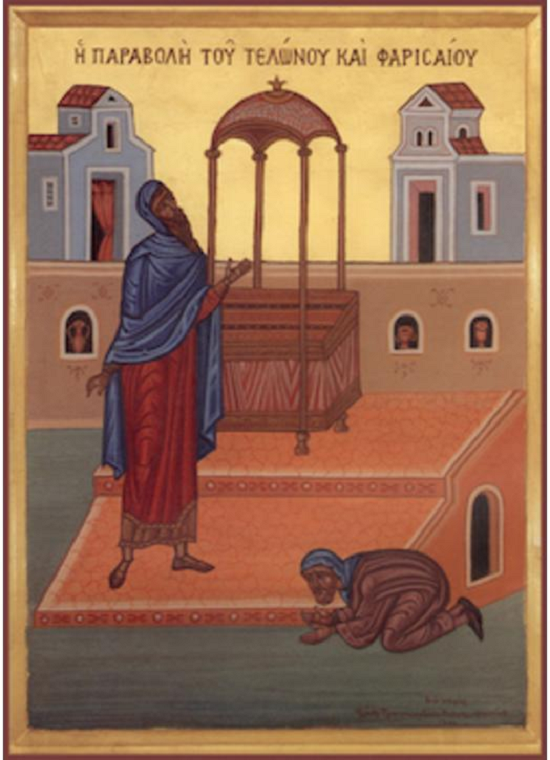Sorrow and Thanksgiving
Scripture Readings

The Pharisee in today’s gospel parable was not a bad person. In fact, the Pharisees as a group were not bad people. They were, in a sense, reformers of the Jewish faith. They were both scholars and pious people. At the time, they were immensely popular because they provided the faithful with an option to the strict and unbending rules of the Sadducees. The Sadducees group was formed out of the priestly caste and the nobility. They accepted only the Torah—the first five books of the Hebrew Bible—and rejected the Prophets and the other writings. They taught that all worship must be centered on the Temple in Jerusalem and sacrifices carried out there.
The Pharisees were the moving force behind the establishment of local synagogues. They read and taught not only the Torah, but the Prophets and other writings as well. Remember Jesus’s first reported sermon that he gave at the Synagogue at Nazareth when he read from the Book of the Prophet Isaiah [Luke 4:16-21]? Not only did the Pharisees accept all the Scriptural books, but they tried to make the Scriptures even more relevant to the people by teaching them also from the commentaries of the great rabbis of the past. They also taught that, as an alternative to offering sacrifices in the Temple, the faithful could obtain equal benefit from giving alms. We can rightfully say that current orthodox Judaism is a direct descendant of the teaching and work of the Pharisees.
At the same time, the Pharisaic movement had some issues. Over time, they became as stringent in enforcing the traditions of the rabbis as the Sadducees had been with their enforcement of the Law of Moses. Jesus even complained about them saying, “You have a fine way of setting aside the commandments of God in order to observe your own traditions’ [Mark 7:9]. What’s more, they began to believe that their way of observing the requirements of their religion was superior to everyone else’s, and they looked down on people who weren’t as observant as they or who didn’t give alms as they did.
So, the Pharisee in the parable was thanking God that he was a good Pharisee. Despite his words, “O God, I thank you…,” there was no real thanksgiving in his prayer. How could he thank God for what he did—or didn’t do? The man thanked God that he wasn’t covetous, that he didn’t lie, cheat, or steal, and that he didn’t cheat on his wife. So, his first claim to fame was all the things he didn’t do. What things did he do? He fasted twice a week—that was a tradition among the Pharisees to fast on Mondays and Thursdays. Also, he gave alms—a percentage of his income. And he thanked God for it? What kind of thanks is that?
We need to be aware that the root of thanksgiving lies in the gift. In Greek—the native language of the Christian Scriptures—thanksgiving is ευχαριστειν (eucharistein) from which we derive our word, “eucharist.” It’s made up of two words, ευ (eu) meaning “good” and χαρις (charis) meaning “gift.” Good gift. In the Pharisee’s prayer, there’s no acknowledgement of any gift, because, to acknowledge a gift requires an understanding that you’re indebted to the giver. Therefore, in the Pharisee’s prayer, there no acknowledgement of his indebtedness to God. It’s an ungrateful thanksgiving, in the same way that saying, “I’m sorry you feel that way,” is an unapologetic apology.
Unlike the Pharisee, the tax collector makes no attempt to justify himself. There’s a difference between guilt and sorrow. Guilt tries to get out of it by making excuses. Whenever we’re tempted to explain why we did something wrong, we’re feeling guilty but not sorry. Sorrow has no need to excuse itself. Sorrow just says, ‘My bad,” and leaves it at that. In his prayer for mercy, the tax collector acknowledged the relationship that the Pharisee totally missed. He understood in a heartfelt way his radical dependence on God. We call that “grace” which is the English version of the Latin word gratia which, again, means “gift.” In his prayer for mercy, the tax collector acknowledged the gift of God in a way the Pharisee couldn’t. In his genuine sorrow, the tax collector found thanksgiving. He found “grace.” He found “eucharist.”
Several times in my homilies this year, I’ve made the point that, regardless of who we are or what we’ve done or haven’t done, we’re all debtors. We’re all wholly reliant on God’s grace. Noone’s accomplishments or supposed status erases that fact. Therefore, there’s no one we can rightfully look down upon with contempt or pity. We’re all God’s children—God’s dependents. By birth, there’s no one greater than we, or less than we. Each of us must come to our own understanding of who we’re called to become and of what gifts we’ve been given to become that person. That knowledge is between us and God. We’re not justified in comparing our giftedness with anyone else’s. Whether we owe a hundred dollars or a million dollars, the fact remains that we owe. The amount of the debt is irrelevant.
This morning, we approach the altar of God in thanksgiving—in eucharist—because we come before God conscious that all we are and all we have are gifts. We’re also conscious of how unworthy we are of the gifts we’ve already received in the past, and how deeply in need we are of God’s gifts for the present and the future. Although it may sound strange to our ears, our prayer of thanksgiving might sound like this: “O God, be merciful to me a sinner!”
Get articles from H. Les Brown delivered to your email inbox.
